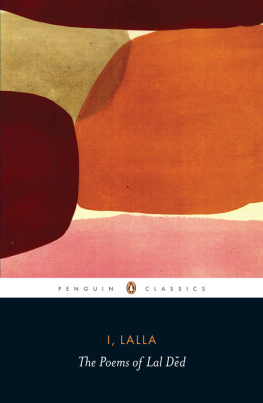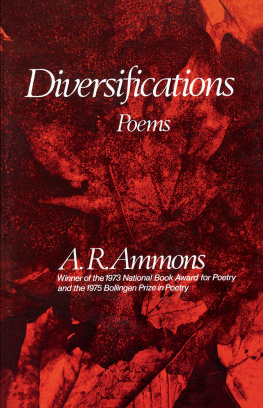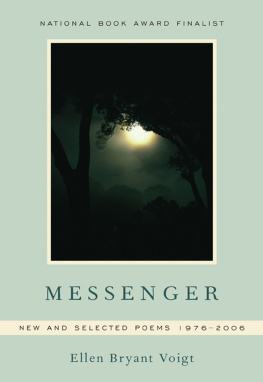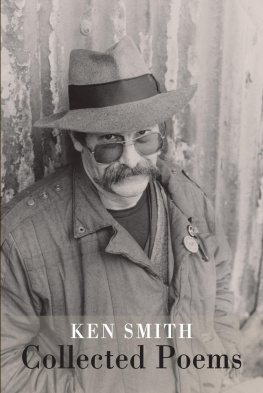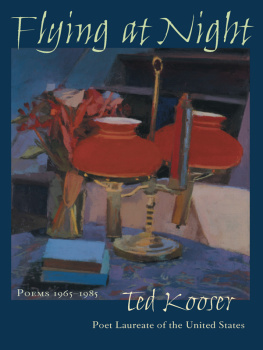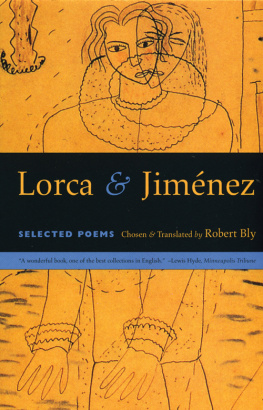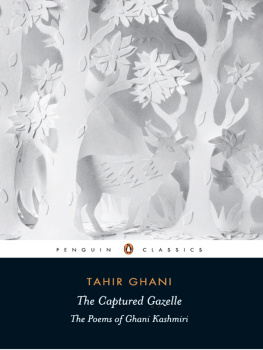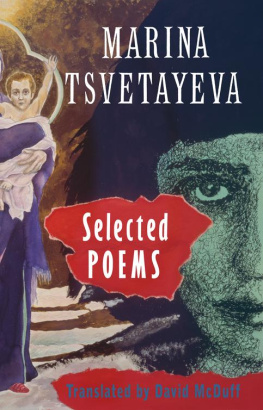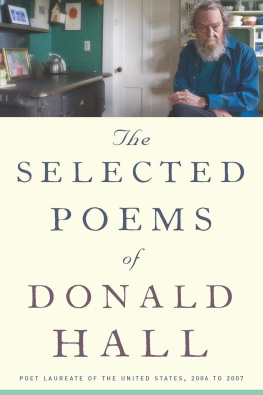
RANJIT HOSKOTE
I, LALLA
The Poems of Lal Dd
Translated from the Kashmiri with an Introduction and Notes by

Contents
PENGUIN CLASSICS
I, LALLA
R ANJIT H OSKOTE is a poet, cultural theorist and curator. His collections of poetry include Vanishing Acts: New & Selected Poems 19852005 (Penguin, 2006) and Die Ankunft der Vgel (Carl Hanser Verlag, 2006). His poems have appeared in Akzente, Boulevard Magenta, Fulcrum, Green Integer Review, Iowa Review, Nthposition and Wespennest. Hoskote was a Fellow of the International Writing Program, University of Iowa (1995), writer-in-residence at Villa Waldberta, Munich (2003), and research scholar in residence at BAK/ basis voor actuele kunst, Utrecht (2010 and 2013).
Praise for the book
Hoskotes success is that we get the feeling of a complex woman, struggling with her times. It is an earthy translation, its rhythms and cadences much more imaginative and intuitive than those which have gone before... this is a book to have and to hold. it is beautiful because it is respectful. It is a great translation because the originals have given way to new meanings Hindustan Times
With its fine balance between scholarship and creative rigour, Hoskotes book is a persuasive reminder that critical intelligence is not incompatible with the quest for the sacred. This connectedness, Lallaas ecstatic mystic and discerning guidereminds us, finds ways to endure, through historical adversity and human amnesia Tehelka
Meticulously researched and beautifully written, the book starts with a 69-page introduction which explains the social, historical and philosophical context of Lallas poems. For the uninitiated, it gives a grounding of the poetic and spiritual legacy of Lal Dd. And for others it unearths the hidden meanings of Lallas Vakhs... When it comes to rendering Lallas words in English, he does an excellent job. No stilted language, no vague phrases and no attempts to temper with the true spirit of the poems for making it more accessible to the Western readers The Hindu
Hoskotes pithy and evocative translation does more than any previous efforts to reduce the semantic gap between Lallas world and ours Rain Taxi Review of Books
Read Hoskotes accomplished translation for the sheer power and colloquial vibrancy with which he retrieves Lalla from the verbosity of Victorian-inflected translations Mint
Hoskotes translations are unadorned and distilled down to the essence... Lal Dds poetry is as timeless and as perfect as the beauty of Kashmir. It reflects the latent yearnings that exist in all seekers Times of India , Crest edition
Hoskotes translations certainly pose a challenge, inflected as they are with deep scholarship and political awareness Sunday Guardian
Poet Ranjit Hoskotes new translation restores the colloquial power of her verse, refreshingly different from earlier ornate paraphrases Indian Express
[It] beautifully presents Lallas writings for what they truly are, and Lalla for what she wasor rather, the different forms that she holds Financial Chronicle
For Amma and Annu, who raised me in the traditions of the Kashmiri diaspora

INTRODUCTION
1. Lal Dd: Life, Poetry and Historical Context
I didnt believe in it for a moment
but I gulped down the wine of my own voice. And then I wrestled with the darkness inside me,
knocked it down, clawed at it, ripped it to shreds.
( POEM 48)
The poems of the fourteenth-century Kashmiri mystic Lal Dd strike us like brief and blinding bursts of light: epiphanic, provocative, they shuttle between the vulnerability of doubt and the assurance of an insight gained through resilience and reflection. These poems are as likely to demand that the Divine reveal Itself, as to complain of Its bewildering and protean ubiquity. They prize clarity of self-knowledge above both the ritualists mastery of observances and the ascetics professional athleticism. If they scoff at the scholar who substitutes experience with scripture and the priest who cages his God in a routine of prayers, they also reject the renouncers austere mortification of the body. Across the expanse of her poetry, the author whose signature these poems carry evolves from a wanderer, uncertain of herself and looking for anchorage in a potentially hostile landscape, into a questor who has found belonging beneath a sky that is continuous with her mind.
To the outer world, Lal Dd is arguably Kashmirs best known spiritual and literary figure; within Kashmir, she has been venerated both by Hindus and Muslims for nearly seven centuries. For most of that period, she has successfully eluded the proprietorial claims of religious monopolists. Since the late 1980s, however, Kashmirs confluential culture has frayed thin under the pressure of a prolonged conflict to which transnational terrorism, state repression and local militancy have all contributed. Religious identities in the region have become harder and more sharp-edged, following a substantial exodus of the Hindu minority during the early 1990s, and a gradual effort to replace Kashmirs unique and syncretically nuanced tradition of Islam with a more Arabocentric global template. It is true that Lal Dd was constructed differently by each community, but she was simultaneously Lallevar or Lalla Yogini to the Hindus and Lal-rifa to the Muslims; today, unfortunately, these descriptions are increasingly being promoted at the expense of one another. In honour of the plural sensibilities that Kashmir has long nurtured, I will refer to this mystic-poet by her most celebrated and nonsectarian appellation, Lal Dd. In the colloquial, this means Grandmother Lal; more literally, it means Lal the Womb, a designation that connects her to the mother goddesses whose cults of fecundity and abundance form the deep substratum of Indic religious life. In writing of her in this book, I will also use the name by which she is most popularly and affectionately known, across community lines: Lalla.
Called vkhs , Lallas poems are among the earliest known manifestations of Kashmiri literature, and record the moment when Kashmiri began to emerge, as a modern language, from the sanskrit-descended Apabhramsa-prakrit that had been the common language of the region through the first millennium CE . The word vkh , applicable both as singular and plural, is cognate with the Sanskrit vc , speech, and vkya, sentence. This has prompted previous translators to render it as saying, verse and verse-teaching; I would prefer to translate it as utterance. A total of 258 vkhs attributed to Lalla have circulated widely and continuously in Kashmiri popular culture between the midfourteenth century and the present, variously assuming the form of songs, proverbs and prayers.
As we have received them, Lallas vkh s bear the definite imprint of an ongoing process of linguistic and cultural change, which is recorded at the level of form, imagery, concept and vocabulary. Some archaic words and phrases remain embedded in these poems, clues attesting to an earlier stratum of the Kashmiri language; some allegorical references may seem arcane on a first reading, their frames lost to view. We find Sanskritic terms and phrases here, drawn from a larger Hindu-Buddhist universe of meaning that extended from Balkh in the west, across Kashmir, Ladakh and Tibet, to China, Korea and Japan in the east, and southward through the Gangetic regions to peninsular India, Sri Lanka and South-east Asia. These Sanskritic elements share conceptual and linguistic space, in the vkh s, with more Arabic or Persianate locutions, indicative of dialogue with the Islamic ecumene that stretched, during Lallas lifetime, from Spain across North Africa and West Asia to China. Accordingly, we find occasional but unmistakeable hints of Sufi and possibly also of Sikh usage in this corpus of poems. And yet, much of Lallas poetry is accessible to the contemporary Kashmiri listener or reader, stabilised in the idiom of the late nineteenth and early twentieth centuries: compelling evidence that this oral archive has been updated from generation to generation. Clearly, Lallas poetry has been continuously read and shared by various assemblies of reciters, scribes and votaries during the nearly seven hundred years of its existence, and has been reshaped and enriched by what we might describe as the informal editorial attention of these assemblies. I shall amplify on this observation in the course of this essay.
Next page
